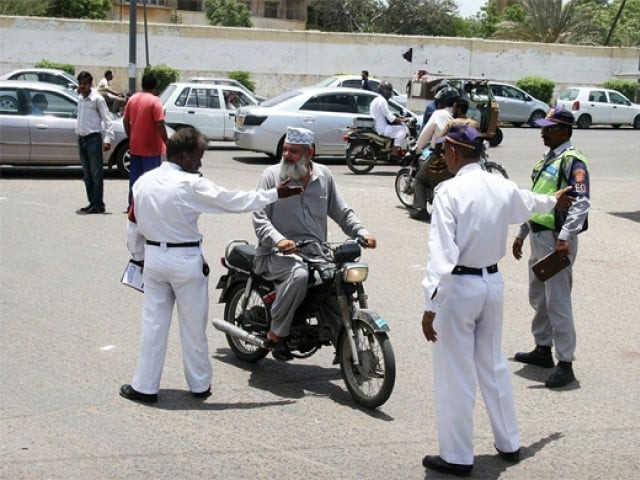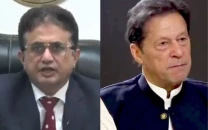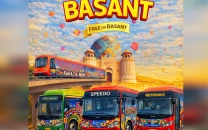Karachi’s new e-challan system drains traffic police earnings
Officers lament loss of ‘income’ and authority as digital fines replace manual challans

Traffic cops across Karachi have long braved the city’s chaos and scorching sun, but arguably have relied on more than just shade – their well known habit of pocketing “compensation” that has kept their pockets from running dry.
The city’s new e-challan system, however, might finally be turning off that revenue stream, pulling the brakes on their side hustle.
With traffic police losing the authority to issue fines directly, their weekly earnings may be significantly impacted. Traffic police’s rule on city streets is also challenged by the new system, diminishing their presence on ground.
Moreover, since the introduction of the e-challan system on October 27, inter-departmental police transfers had increased, Deputy Inspector General (DIG) Traffic Police, Pir Muhammad Shah, said speaking to The Express Tribune.
These transfers, it may be argued, had hiked due to traffic police officers moving to departments or locations that may still facilitate the “traditional” system of taking bribes.
However, upon instruction of the inspector general of Sindh, inter-departmental transfers have been suspended until further notice, DIG Shah announced.
Read: Karachi to get faceless e-challan system
For years, one constant in traffic policing has been the unofficial demands or expectations from senior officers that field staff or checkpoint in-charges had to fulfill. Now, field officers say they no longer have the means to meet those demands.
A traffic officer who once fulfilled such requests, S*, says, “the e-challan could become a milestone for professional policing, but it may also disrupt many internal matters of the traffic police. Now, our source of income is limited to roadside stalls and vendors.”
DIG Shah also admitted that in the past traffic police officials would take bribes, but assured that the practice has decreased since the introduction of the digital system.
Further, I*, an officer posted in New Karachi, remarks, “now we can’t threaten citizens with challans and take bribes directly, but there are still ways to make money. For example, traffic police can file a case under Section 341 (obstruction of public way) or Section 188 (negligent driving) against a vendor or driver.”
He explained that even for a minor offense, once an FIR is filed, the accused may spend at least Rs50,000 on court proceedings, lawyers’ fees, and in getting their vehicle released from the police station.
To avoid this, most drivers settle the matter “off the record,” forking over amounts ranging from Rs1,000 to Rs10,000. At the traffic police checkpoint next to Sharifabad Police Station, which handles impounded vehicles from District Central, the head moharrar is considered the real authority. Similar practices, he said, exist in every district – only the faces and locations differ.
A traffic constable posted in Nazimabad comments, “now people will finally understand what real fines are. We used to take a hundred or two and let bikers go. Let’s see how they’ll escape the cameras now.”
Read More: Karachi's e-challan system made operational; Rs13m fines issued in just six hours
Meanwhile, constable Z*, added with a smile, “sometimes, if an officer wasn’t around and a biker didn’t have money, we’d let him go for a cigarette or a packet of gutka or mawa. But now, that’s not possible.”
I*, a traffic police inspector, says “the e-challan fines are too high. If a motorbike costs Rs30,000 and the fine is Rs20,000, what is a person supposed to do – kill himself or burn the bike? The government must immediately review the fine amounts before something serious happens.”
Many officers believe that the faceless e-challan system won’t last long in Karachi. They expect that soon, they’ll be provided with camera-equipped devices that will allow them to collect digital evidence and regain control over the challan process.
Since the launch of e-challans on October 27, a noticeable decrease in the presence of traffic police has been observed on city roads.
To verify citizens’ complaints, The Express Tribune conducted a survey from Mosamiyat to Nipa Chowrangi, via University Road, on October 31 between 4pm and 5pm.
During the journey, not a single traffic officer was seen on duty – even though BRT construction has narrowed the road to the size of a residential lane, and heavy traffic from Safari Park and the opposite direction regularly causes jams.
Meanwhile, on Sharae Faisal, only one officer was found near the Maritime Museum signal.
Opposing common sentiment among traffic police, an officer near the Karsaz Flyover praised the e-challan initiative, saying, “most of the bribe money went to senior officers anyway. The constables only got public curses and insults.”
He added with emotion, “last year, the official challan commission for a constable was Rs9,000 – but only on paper. We never received even a single rupee. However, last month, thanks to DIG traffic, Rs5,000 was transferred into our accounts out of the Rs7,000 that was promised. As for the remaining Rs2,000, we don’t know where it went. Maybe some officer needed it more than we did.”
*Names have been omitted to protect identity






















COMMENTS
Comments are moderated and generally will be posted if they are on-topic and not abusive.
For more information, please see our Comments FAQ